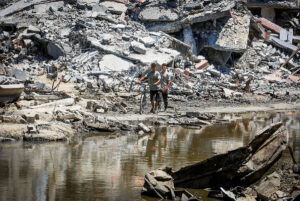‘The polio vaccine is effective, but delivering it requires a ceasefire’

Palestinians walk next to destroyed buildings and pools with stagnant water in Khan Younis, southern Gaza, 19 July 2024
Ruwaida Kamal Amer reports in +972 on 27 August 2024:
For 25 years, the Gaza Strip was free of polio. No longer. Earlier this month, the health ministry reported that a 10-month-old baby had contracted the disease; a week later, he was paralyzed. This came after polio virus had been detected in sewage samples from six locations in the cities of Deir Al-Balah and Khan Younis.
With raw sewage flowing through Gaza’s streets, in close proximity to the tents of displaced people and the few remaining sources of freshwater, a potentially catastrophic epidemic could soon be afoot. A mass vaccination campaign is essential, but so long as Israel’s military offensive continues, such a campaign seems impossible — even as vaccines have started to be brought in. All across the Gaza Strip, Palestinians fear the consequences of the spread of the disease, especially to children who comprise half of the enclave’s population.
“When my children go out to play, we run after them, shouting not to go near the sewage water,” Reem Al-Masry, a 35-year-old mother of three displaced from Beit Hanoun to Deir al-Balah, told +972. “But they are bitten all the time by mosquitoes and flies that live on piles of garbage and sewage and transmit diseases to us. Every day, my children complain of stomach pain, fever, skin rashes, and other health problems.”
…. ….. …..
Just hours before the first case of polio was reported in Gaza, UN Secretary General António Guterres called for an immediate, weeklong ceasefire — a “polio pause” — to allow for the rollout of a vaccination campaign. The World Health Organization (WHO) declared that it was ready to release 1.6 million doses, with UNRWA medical teams preparing to administer them to more than 640,000 Palestinian children under the age of 10.
Israel quickly began vaccinating its own soldiers against the disease, but waited several weeks before permitting the entry of vaccines for Gazans. Yet even as medical teams seek to inoculate the population, no ceasefire appears forthcoming.
“The oral polio vaccine is effective,” Sameer Sah, the UK director of programmes at Medical Aid for Palestinians (MAP), told +972. “The challenge is in delivering the vaccine in an area where people are being displaced on a near-daily basis, means of transport are difficult to find, roads are damaged, and health services are being attacked.
